Marketing in Travel and Tourism: London Destination & Virgin Atlantic
VerifiedAdded on 2024/06/03
|21
|4436
|365
Report
AI Summary
This report provides a comprehensive analysis of marketing in the travel and tourism sector, focusing on London as a tourist destination and Virgin Atlantic as a case study. It discusses core marketing concepts and their application to London, analyzes the tourism marketing environment, and examines factors affecting consumer motivation and demand. The report also delves into market segmentation principles and their use in destination marketing planning. Furthermore, it critically analyzes the importance of strategic marketing planning, the relevance of marketing research, and the positive and negative influences of marketing on society. The marketing mix elements, including product, price, and place, are identified and discussed for Virgin Atlantic, along with the significance of service sector mix elements and the concept of the 'Total Tourism Product'. Finally, the integrated nature and role of the promotional mix are assessed with reference to Virgin Atlantic, culminating in a planned and justified integrated promotional campaign.
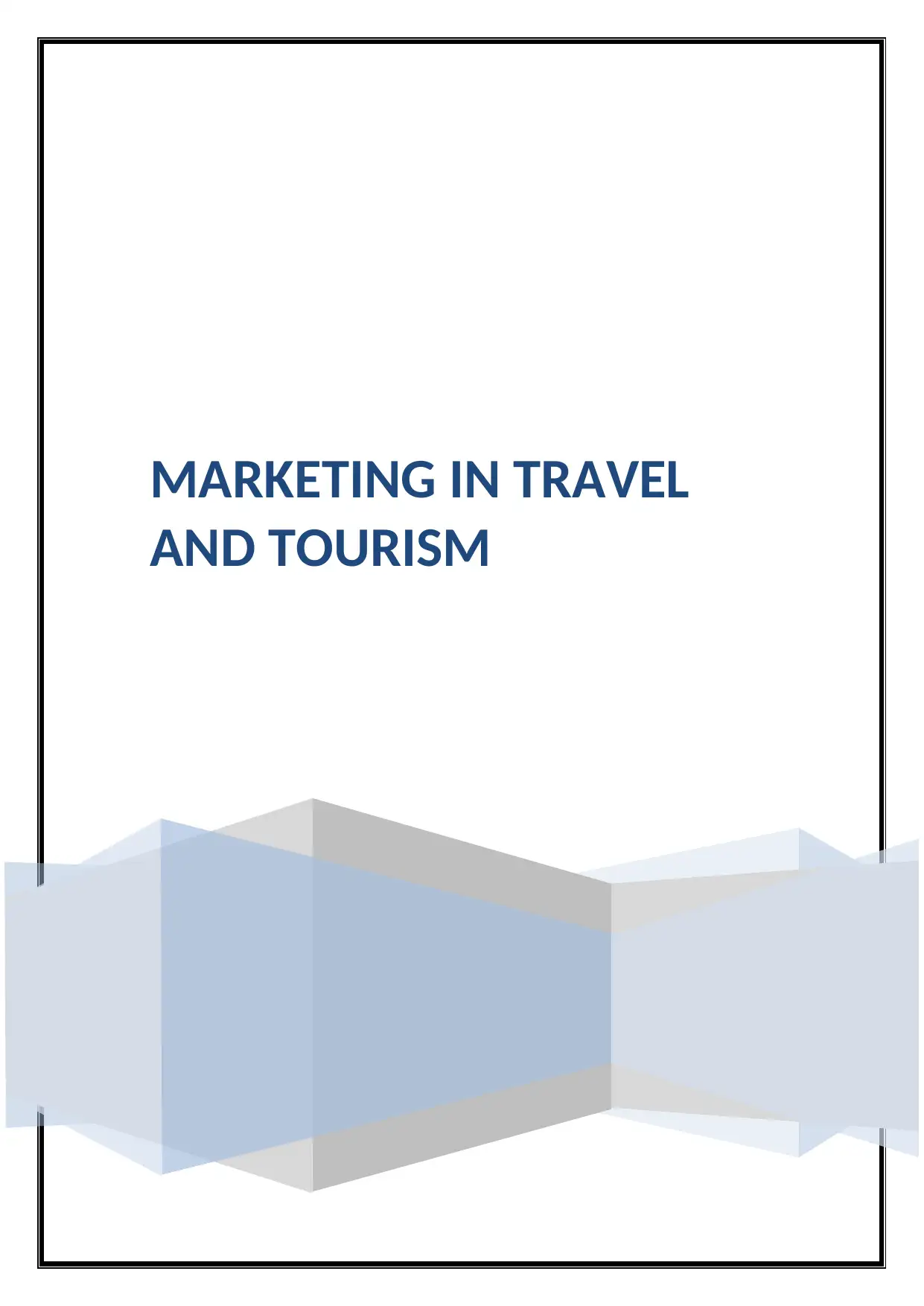
MARKETING IN TRAVEL
AND TOURISM
AND TOURISM
Paraphrase This Document
Need a fresh take? Get an instant paraphrase of this document with our AI Paraphraser
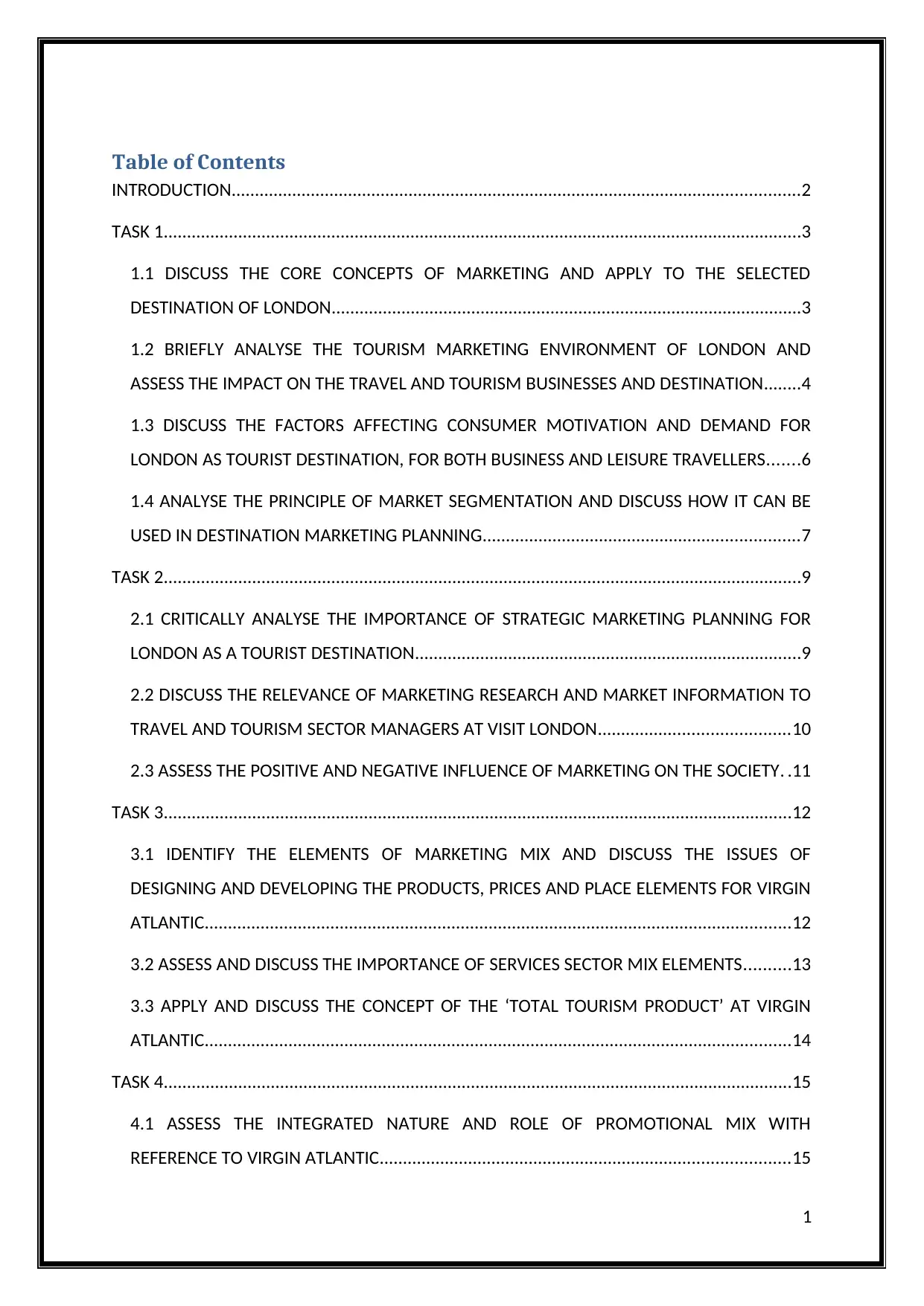
Table of Contents
INTRODUCTION..........................................................................................................................2
TASK 1.........................................................................................................................................3
1.1 DISCUSS THE CORE CONCEPTS OF MARKETING AND APPLY TO THE SELECTED
DESTINATION OF LONDON.....................................................................................................3
1.2 BRIEFLY ANALYSE THE TOURISM MARKETING ENVIRONMENT OF LONDON AND
ASSESS THE IMPACT ON THE TRAVEL AND TOURISM BUSINESSES AND DESTINATION........4
1.3 DISCUSS THE FACTORS AFFECTING CONSUMER MOTIVATION AND DEMAND FOR
LONDON AS TOURIST DESTINATION, FOR BOTH BUSINESS AND LEISURE TRAVELLERS.......6
1.4 ANALYSE THE PRINCIPLE OF MARKET SEGMENTATION AND DISCUSS HOW IT CAN BE
USED IN DESTINATION MARKETING PLANNING....................................................................7
TASK 2.........................................................................................................................................9
2.1 CRITICALLY ANALYSE THE IMPORTANCE OF STRATEGIC MARKETING PLANNING FOR
LONDON AS A TOURIST DESTINATION...................................................................................9
2.2 DISCUSS THE RELEVANCE OF MARKETING RESEARCH AND MARKET INFORMATION TO
TRAVEL AND TOURISM SECTOR MANAGERS AT VISIT LONDON.........................................10
2.3 ASSESS THE POSITIVE AND NEGATIVE INFLUENCE OF MARKETING ON THE SOCIETY. .11
TASK 3.......................................................................................................................................12
3.1 IDENTIFY THE ELEMENTS OF MARKETING MIX AND DISCUSS THE ISSUES OF
DESIGNING AND DEVELOPING THE PRODUCTS, PRICES AND PLACE ELEMENTS FOR VIRGIN
ATLANTIC..............................................................................................................................12
3.2 ASSESS AND DISCUSS THE IMPORTANCE OF SERVICES SECTOR MIX ELEMENTS..........13
3.3 APPLY AND DISCUSS THE CONCEPT OF THE ‘TOTAL TOURISM PRODUCT’ AT VIRGIN
ATLANTIC..............................................................................................................................14
TASK 4.......................................................................................................................................15
4.1 ASSESS THE INTEGRATED NATURE AND ROLE OF PROMOTIONAL MIX WITH
REFERENCE TO VIRGIN ATLANTIC........................................................................................15
1
INTRODUCTION..........................................................................................................................2
TASK 1.........................................................................................................................................3
1.1 DISCUSS THE CORE CONCEPTS OF MARKETING AND APPLY TO THE SELECTED
DESTINATION OF LONDON.....................................................................................................3
1.2 BRIEFLY ANALYSE THE TOURISM MARKETING ENVIRONMENT OF LONDON AND
ASSESS THE IMPACT ON THE TRAVEL AND TOURISM BUSINESSES AND DESTINATION........4
1.3 DISCUSS THE FACTORS AFFECTING CONSUMER MOTIVATION AND DEMAND FOR
LONDON AS TOURIST DESTINATION, FOR BOTH BUSINESS AND LEISURE TRAVELLERS.......6
1.4 ANALYSE THE PRINCIPLE OF MARKET SEGMENTATION AND DISCUSS HOW IT CAN BE
USED IN DESTINATION MARKETING PLANNING....................................................................7
TASK 2.........................................................................................................................................9
2.1 CRITICALLY ANALYSE THE IMPORTANCE OF STRATEGIC MARKETING PLANNING FOR
LONDON AS A TOURIST DESTINATION...................................................................................9
2.2 DISCUSS THE RELEVANCE OF MARKETING RESEARCH AND MARKET INFORMATION TO
TRAVEL AND TOURISM SECTOR MANAGERS AT VISIT LONDON.........................................10
2.3 ASSESS THE POSITIVE AND NEGATIVE INFLUENCE OF MARKETING ON THE SOCIETY. .11
TASK 3.......................................................................................................................................12
3.1 IDENTIFY THE ELEMENTS OF MARKETING MIX AND DISCUSS THE ISSUES OF
DESIGNING AND DEVELOPING THE PRODUCTS, PRICES AND PLACE ELEMENTS FOR VIRGIN
ATLANTIC..............................................................................................................................12
3.2 ASSESS AND DISCUSS THE IMPORTANCE OF SERVICES SECTOR MIX ELEMENTS..........13
3.3 APPLY AND DISCUSS THE CONCEPT OF THE ‘TOTAL TOURISM PRODUCT’ AT VIRGIN
ATLANTIC..............................................................................................................................14
TASK 4.......................................................................................................................................15
4.1 ASSESS THE INTEGRATED NATURE AND ROLE OF PROMOTIONAL MIX WITH
REFERENCE TO VIRGIN ATLANTIC........................................................................................15
1
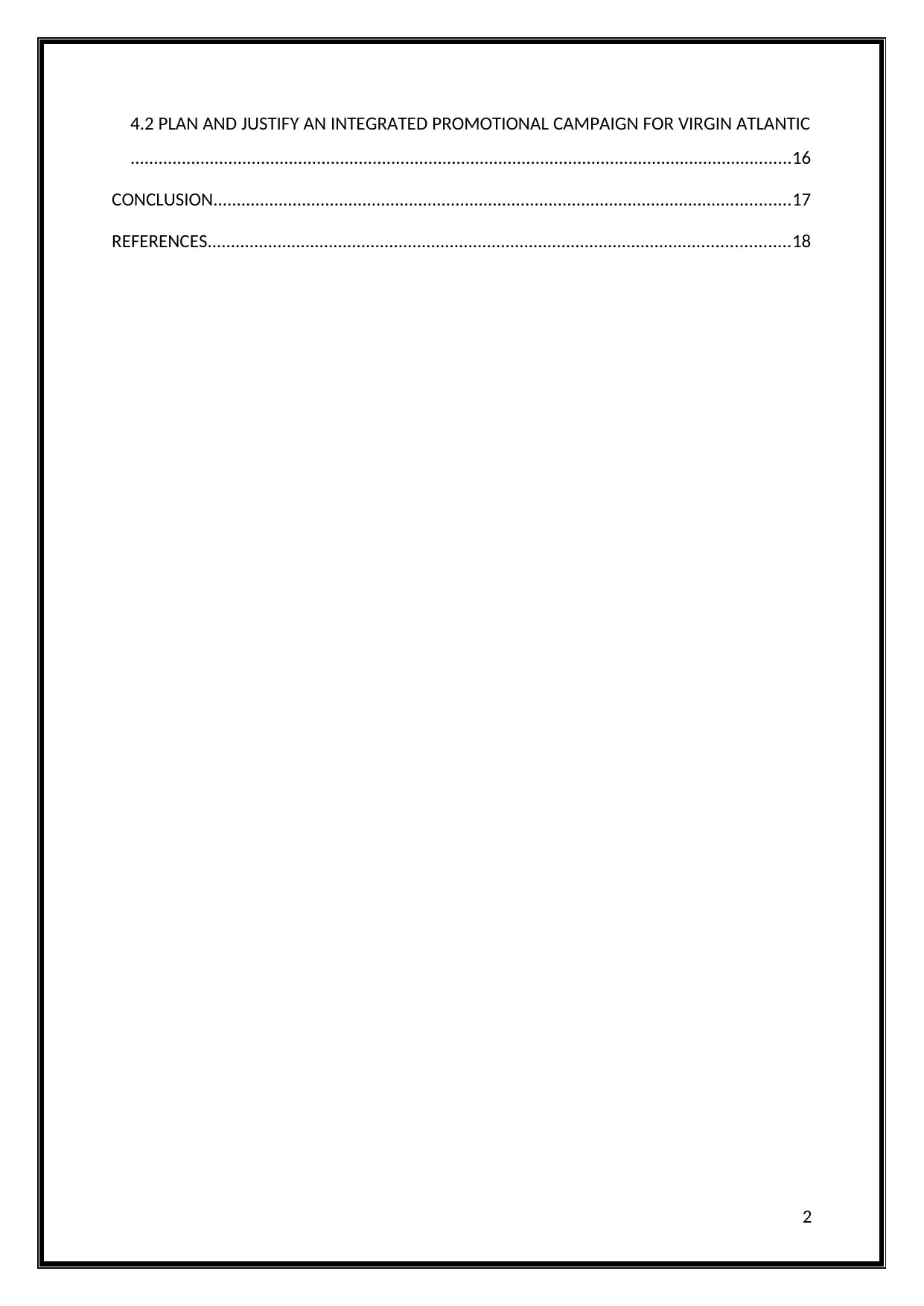
4.2 PLAN AND JUSTIFY AN INTEGRATED PROMOTIONAL CAMPAIGN FOR VIRGIN ATLANTIC
..............................................................................................................................................16
CONCLUSION............................................................................................................................17
REFERENCES.............................................................................................................................18
2
..............................................................................................................................................16
CONCLUSION............................................................................................................................17
REFERENCES.............................................................................................................................18
2
⊘ This is a preview!⊘
Do you want full access?
Subscribe today to unlock all pages.

Trusted by 1+ million students worldwide
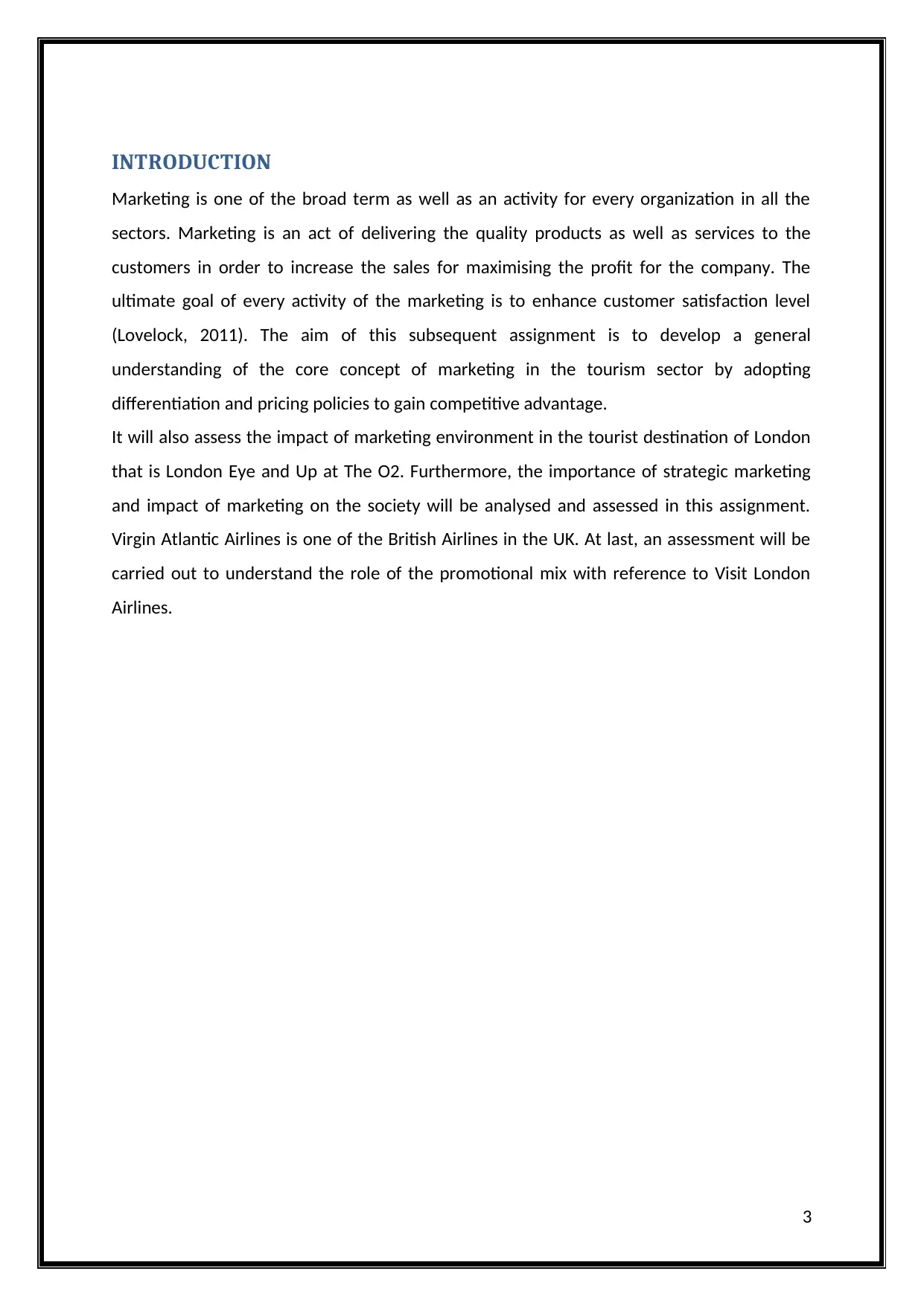
INTRODUCTION
Marketing is one of the broad term as well as an activity for every organization in all the
sectors. Marketing is an act of delivering the quality products as well as services to the
customers in order to increase the sales for maximising the profit for the company. The
ultimate goal of every activity of the marketing is to enhance customer satisfaction level
(Lovelock, 2011). The aim of this subsequent assignment is to develop a general
understanding of the core concept of marketing in the tourism sector by adopting
differentiation and pricing policies to gain competitive advantage.
It will also assess the impact of marketing environment in the tourist destination of London
that is London Eye and Up at The O2. Furthermore, the importance of strategic marketing
and impact of marketing on the society will be analysed and assessed in this assignment.
Virgin Atlantic Airlines is one of the British Airlines in the UK. At last, an assessment will be
carried out to understand the role of the promotional mix with reference to Visit London
Airlines.
3
Marketing is one of the broad term as well as an activity for every organization in all the
sectors. Marketing is an act of delivering the quality products as well as services to the
customers in order to increase the sales for maximising the profit for the company. The
ultimate goal of every activity of the marketing is to enhance customer satisfaction level
(Lovelock, 2011). The aim of this subsequent assignment is to develop a general
understanding of the core concept of marketing in the tourism sector by adopting
differentiation and pricing policies to gain competitive advantage.
It will also assess the impact of marketing environment in the tourist destination of London
that is London Eye and Up at The O2. Furthermore, the importance of strategic marketing
and impact of marketing on the society will be analysed and assessed in this assignment.
Virgin Atlantic Airlines is one of the British Airlines in the UK. At last, an assessment will be
carried out to understand the role of the promotional mix with reference to Visit London
Airlines.
3
Paraphrase This Document
Need a fresh take? Get an instant paraphrase of this document with our AI Paraphraser
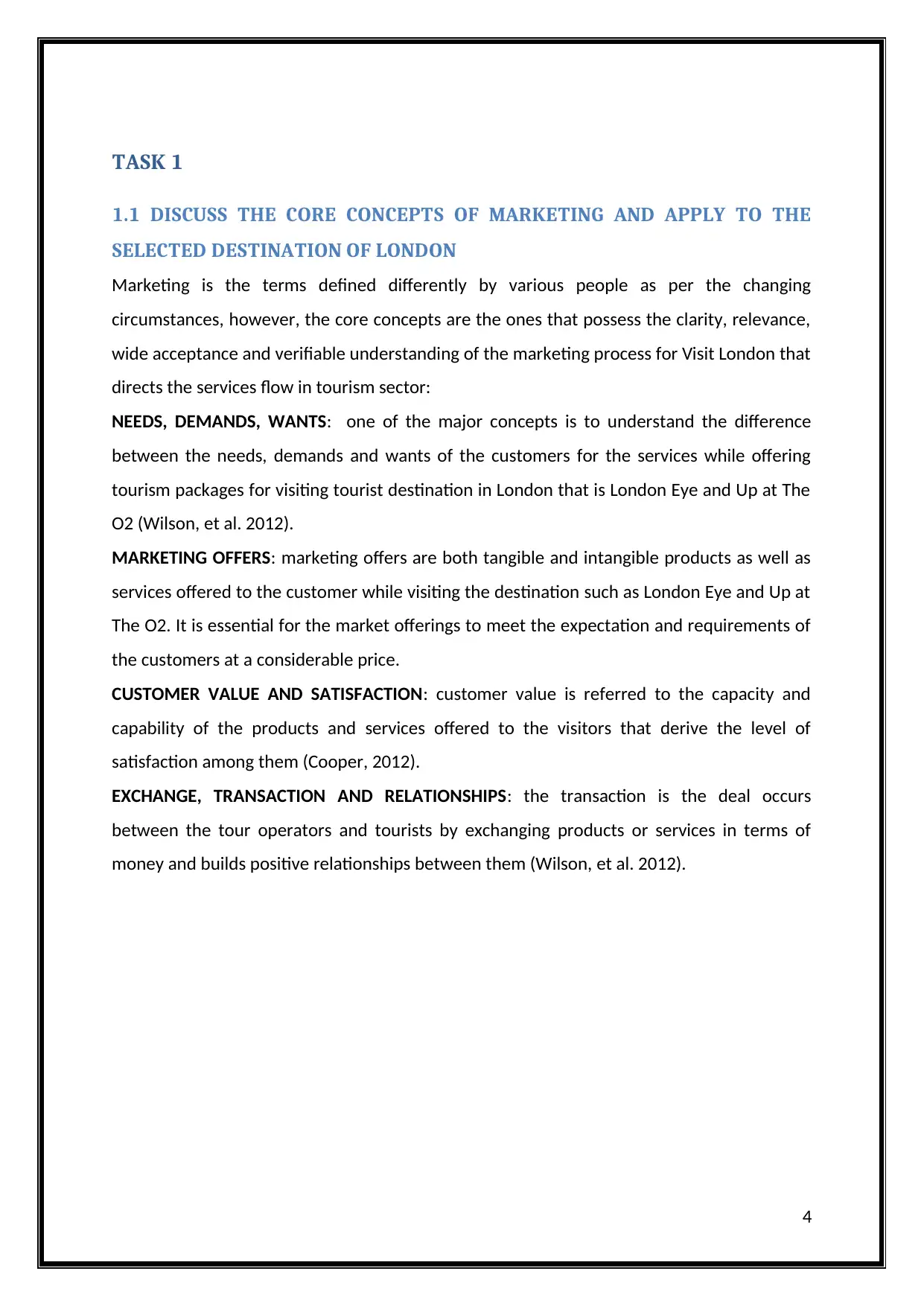
TASK 1
1.1 DISCUSS THE CORE CONCEPTS OF MARKETING AND APPLY TO THE
SELECTED DESTINATION OF LONDON
Marketing is the terms defined differently by various people as per the changing
circumstances, however, the core concepts are the ones that possess the clarity, relevance,
wide acceptance and verifiable understanding of the marketing process for Visit London that
directs the services flow in tourism sector:
NEEDS, DEMANDS, WANTS: one of the major concepts is to understand the difference
between the needs, demands and wants of the customers for the services while offering
tourism packages for visiting tourist destination in London that is London Eye and Up at The
O2 (Wilson, et al. 2012).
MARKETING OFFERS: marketing offers are both tangible and intangible products as well as
services offered to the customer while visiting the destination such as London Eye and Up at
The O2. It is essential for the market offerings to meet the expectation and requirements of
the customers at a considerable price.
CUSTOMER VALUE AND SATISFACTION: customer value is referred to the capacity and
capability of the products and services offered to the visitors that derive the level of
satisfaction among them (Cooper, 2012).
EXCHANGE, TRANSACTION AND RELATIONSHIPS: the transaction is the deal occurs
between the tour operators and tourists by exchanging products or services in terms of
money and builds positive relationships between them (Wilson, et al. 2012).
4
1.1 DISCUSS THE CORE CONCEPTS OF MARKETING AND APPLY TO THE
SELECTED DESTINATION OF LONDON
Marketing is the terms defined differently by various people as per the changing
circumstances, however, the core concepts are the ones that possess the clarity, relevance,
wide acceptance and verifiable understanding of the marketing process for Visit London that
directs the services flow in tourism sector:
NEEDS, DEMANDS, WANTS: one of the major concepts is to understand the difference
between the needs, demands and wants of the customers for the services while offering
tourism packages for visiting tourist destination in London that is London Eye and Up at The
O2 (Wilson, et al. 2012).
MARKETING OFFERS: marketing offers are both tangible and intangible products as well as
services offered to the customer while visiting the destination such as London Eye and Up at
The O2. It is essential for the market offerings to meet the expectation and requirements of
the customers at a considerable price.
CUSTOMER VALUE AND SATISFACTION: customer value is referred to the capacity and
capability of the products and services offered to the visitors that derive the level of
satisfaction among them (Cooper, 2012).
EXCHANGE, TRANSACTION AND RELATIONSHIPS: the transaction is the deal occurs
between the tour operators and tourists by exchanging products or services in terms of
money and builds positive relationships between them (Wilson, et al. 2012).
4
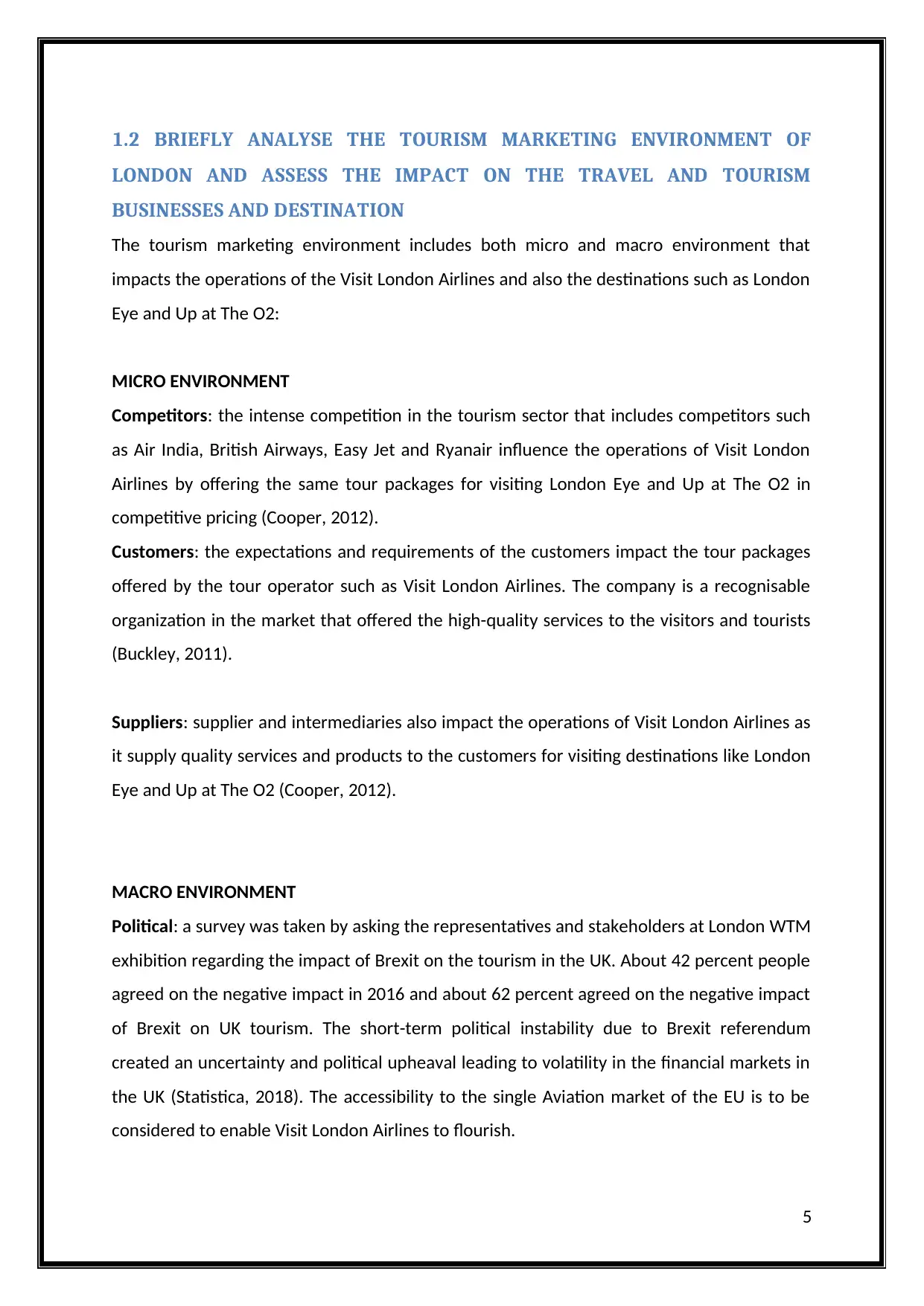
1.2 BRIEFLY ANALYSE THE TOURISM MARKETING ENVIRONMENT OF
LONDON AND ASSESS THE IMPACT ON THE TRAVEL AND TOURISM
BUSINESSES AND DESTINATION
The tourism marketing environment includes both micro and macro environment that
impacts the operations of the Visit London Airlines and also the destinations such as London
Eye and Up at The O2:
MICRO ENVIRONMENT
Competitors: the intense competition in the tourism sector that includes competitors such
as Air India, British Airways, Easy Jet and Ryanair influence the operations of Visit London
Airlines by offering the same tour packages for visiting London Eye and Up at The O2 in
competitive pricing (Cooper, 2012).
Customers: the expectations and requirements of the customers impact the tour packages
offered by the tour operator such as Visit London Airlines. The company is a recognisable
organization in the market that offered the high-quality services to the visitors and tourists
(Buckley, 2011).
Suppliers: supplier and intermediaries also impact the operations of Visit London Airlines as
it supply quality services and products to the customers for visiting destinations like London
Eye and Up at The O2 (Cooper, 2012).
MACRO ENVIRONMENT
Political: a survey was taken by asking the representatives and stakeholders at London WTM
exhibition regarding the impact of Brexit on the tourism in the UK. About 42 percent people
agreed on the negative impact in 2016 and about 62 percent agreed on the negative impact
of Brexit on UK tourism. The short-term political instability due to Brexit referendum
created an uncertainty and political upheaval leading to volatility in the financial markets in
the UK (Statistica, 2018). The accessibility to the single Aviation market of the EU is to be
considered to enable Visit London Airlines to flourish.
5
LONDON AND ASSESS THE IMPACT ON THE TRAVEL AND TOURISM
BUSINESSES AND DESTINATION
The tourism marketing environment includes both micro and macro environment that
impacts the operations of the Visit London Airlines and also the destinations such as London
Eye and Up at The O2:
MICRO ENVIRONMENT
Competitors: the intense competition in the tourism sector that includes competitors such
as Air India, British Airways, Easy Jet and Ryanair influence the operations of Visit London
Airlines by offering the same tour packages for visiting London Eye and Up at The O2 in
competitive pricing (Cooper, 2012).
Customers: the expectations and requirements of the customers impact the tour packages
offered by the tour operator such as Visit London Airlines. The company is a recognisable
organization in the market that offered the high-quality services to the visitors and tourists
(Buckley, 2011).
Suppliers: supplier and intermediaries also impact the operations of Visit London Airlines as
it supply quality services and products to the customers for visiting destinations like London
Eye and Up at The O2 (Cooper, 2012).
MACRO ENVIRONMENT
Political: a survey was taken by asking the representatives and stakeholders at London WTM
exhibition regarding the impact of Brexit on the tourism in the UK. About 42 percent people
agreed on the negative impact in 2016 and about 62 percent agreed on the negative impact
of Brexit on UK tourism. The short-term political instability due to Brexit referendum
created an uncertainty and political upheaval leading to volatility in the financial markets in
the UK (Statistica, 2018). The accessibility to the single Aviation market of the EU is to be
considered to enable Visit London Airlines to flourish.
5
⊘ This is a preview!⊘
Do you want full access?
Subscribe today to unlock all pages.

Trusted by 1+ million students worldwide
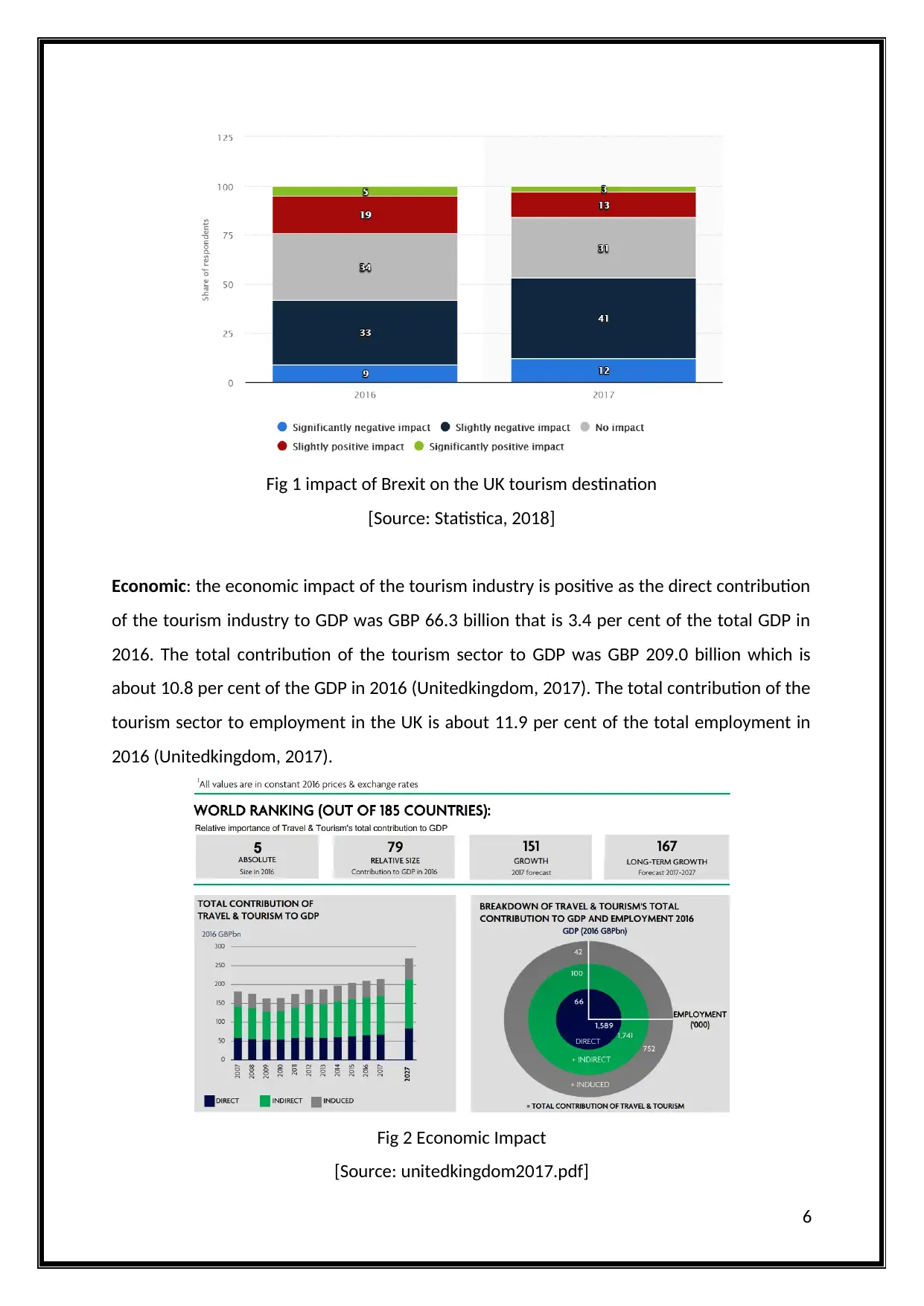
Fig 1 impact of Brexit on the UK tourism destination
[Source: Statistica, 2018]
Economic: the economic impact of the tourism industry is positive as the direct contribution
of the tourism industry to GDP was GBP 66.3 billion that is 3.4 per cent of the total GDP in
2016. The total contribution of the tourism sector to GDP was GBP 209.0 billion which is
about 10.8 per cent of the GDP in 2016 (Unitedkingdom, 2017). The total contribution of the
tourism sector to employment in the UK is about 11.9 per cent of the total employment in
2016 (Unitedkingdom, 2017).
Fig 2 Economic Impact
[Source: unitedkingdom2017.pdf]
6
[Source: Statistica, 2018]
Economic: the economic impact of the tourism industry is positive as the direct contribution
of the tourism industry to GDP was GBP 66.3 billion that is 3.4 per cent of the total GDP in
2016. The total contribution of the tourism sector to GDP was GBP 209.0 billion which is
about 10.8 per cent of the GDP in 2016 (Unitedkingdom, 2017). The total contribution of the
tourism sector to employment in the UK is about 11.9 per cent of the total employment in
2016 (Unitedkingdom, 2017).
Fig 2 Economic Impact
[Source: unitedkingdom2017.pdf]
6
Paraphrase This Document
Need a fresh take? Get an instant paraphrase of this document with our AI Paraphraser
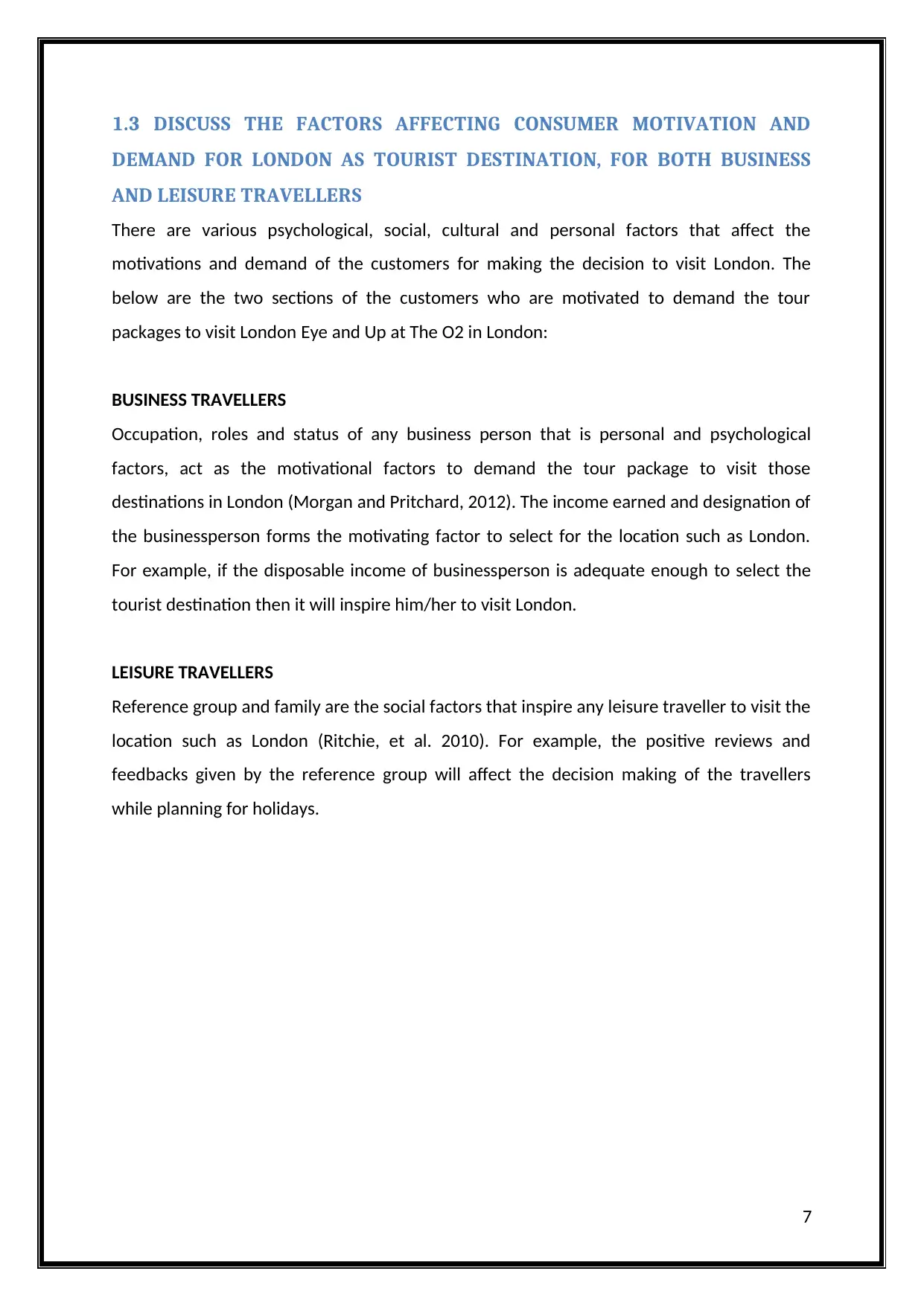
1.3 DISCUSS THE FACTORS AFFECTING CONSUMER MOTIVATION AND
DEMAND FOR LONDON AS TOURIST DESTINATION, FOR BOTH BUSINESS
AND LEISURE TRAVELLERS
There are various psychological, social, cultural and personal factors that affect the
motivations and demand of the customers for making the decision to visit London. The
below are the two sections of the customers who are motivated to demand the tour
packages to visit London Eye and Up at The O2 in London:
BUSINESS TRAVELLERS
Occupation, roles and status of any business person that is personal and psychological
factors, act as the motivational factors to demand the tour package to visit those
destinations in London (Morgan and Pritchard, 2012). The income earned and designation of
the businessperson forms the motivating factor to select for the location such as London.
For example, if the disposable income of businessperson is adequate enough to select the
tourist destination then it will inspire him/her to visit London.
LEISURE TRAVELLERS
Reference group and family are the social factors that inspire any leisure traveller to visit the
location such as London (Ritchie, et al. 2010). For example, the positive reviews and
feedbacks given by the reference group will affect the decision making of the travellers
while planning for holidays.
7
DEMAND FOR LONDON AS TOURIST DESTINATION, FOR BOTH BUSINESS
AND LEISURE TRAVELLERS
There are various psychological, social, cultural and personal factors that affect the
motivations and demand of the customers for making the decision to visit London. The
below are the two sections of the customers who are motivated to demand the tour
packages to visit London Eye and Up at The O2 in London:
BUSINESS TRAVELLERS
Occupation, roles and status of any business person that is personal and psychological
factors, act as the motivational factors to demand the tour package to visit those
destinations in London (Morgan and Pritchard, 2012). The income earned and designation of
the businessperson forms the motivating factor to select for the location such as London.
For example, if the disposable income of businessperson is adequate enough to select the
tourist destination then it will inspire him/her to visit London.
LEISURE TRAVELLERS
Reference group and family are the social factors that inspire any leisure traveller to visit the
location such as London (Ritchie, et al. 2010). For example, the positive reviews and
feedbacks given by the reference group will affect the decision making of the travellers
while planning for holidays.
7
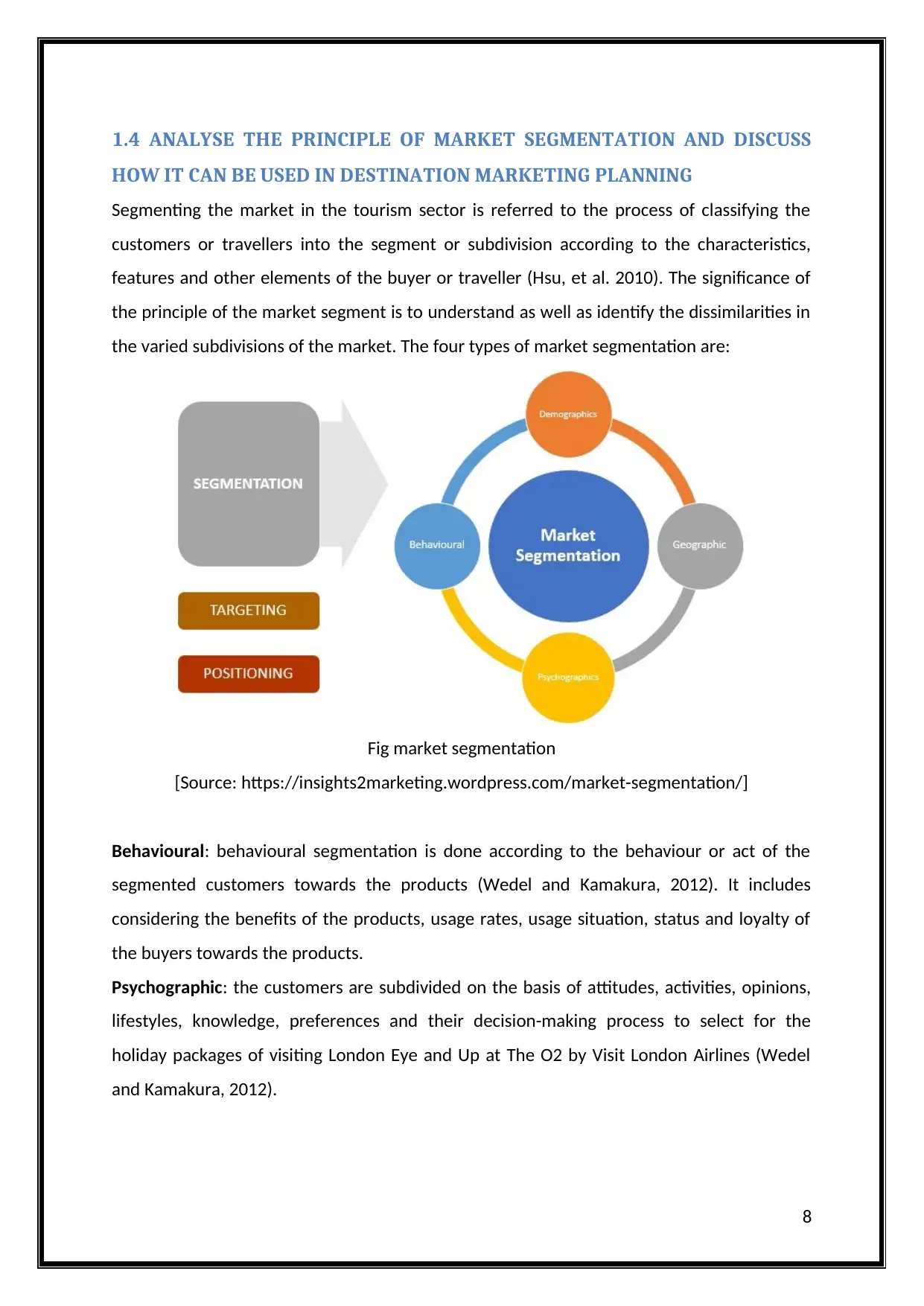
1.4 ANALYSE THE PRINCIPLE OF MARKET SEGMENTATION AND DISCUSS
HOW IT CAN BE USED IN DESTINATION MARKETING PLANNING
Segmenting the market in the tourism sector is referred to the process of classifying the
customers or travellers into the segment or subdivision according to the characteristics,
features and other elements of the buyer or traveller (Hsu, et al. 2010). The significance of
the principle of the market segment is to understand as well as identify the dissimilarities in
the varied subdivisions of the market. The four types of market segmentation are:
Fig market segmentation
[Source: https://insights2marketing.wordpress.com/market-segmentation/]
Behavioural: behavioural segmentation is done according to the behaviour or act of the
segmented customers towards the products (Wedel and Kamakura, 2012). It includes
considering the benefits of the products, usage rates, usage situation, status and loyalty of
the buyers towards the products.
Psychographic: the customers are subdivided on the basis of attitudes, activities, opinions,
lifestyles, knowledge, preferences and their decision-making process to select for the
holiday packages of visiting London Eye and Up at The O2 by Visit London Airlines (Wedel
and Kamakura, 2012).
8
HOW IT CAN BE USED IN DESTINATION MARKETING PLANNING
Segmenting the market in the tourism sector is referred to the process of classifying the
customers or travellers into the segment or subdivision according to the characteristics,
features and other elements of the buyer or traveller (Hsu, et al. 2010). The significance of
the principle of the market segment is to understand as well as identify the dissimilarities in
the varied subdivisions of the market. The four types of market segmentation are:
Fig market segmentation
[Source: https://insights2marketing.wordpress.com/market-segmentation/]
Behavioural: behavioural segmentation is done according to the behaviour or act of the
segmented customers towards the products (Wedel and Kamakura, 2012). It includes
considering the benefits of the products, usage rates, usage situation, status and loyalty of
the buyers towards the products.
Psychographic: the customers are subdivided on the basis of attitudes, activities, opinions,
lifestyles, knowledge, preferences and their decision-making process to select for the
holiday packages of visiting London Eye and Up at The O2 by Visit London Airlines (Wedel
and Kamakura, 2012).
8
⊘ This is a preview!⊘
Do you want full access?
Subscribe today to unlock all pages.

Trusted by 1+ million students worldwide
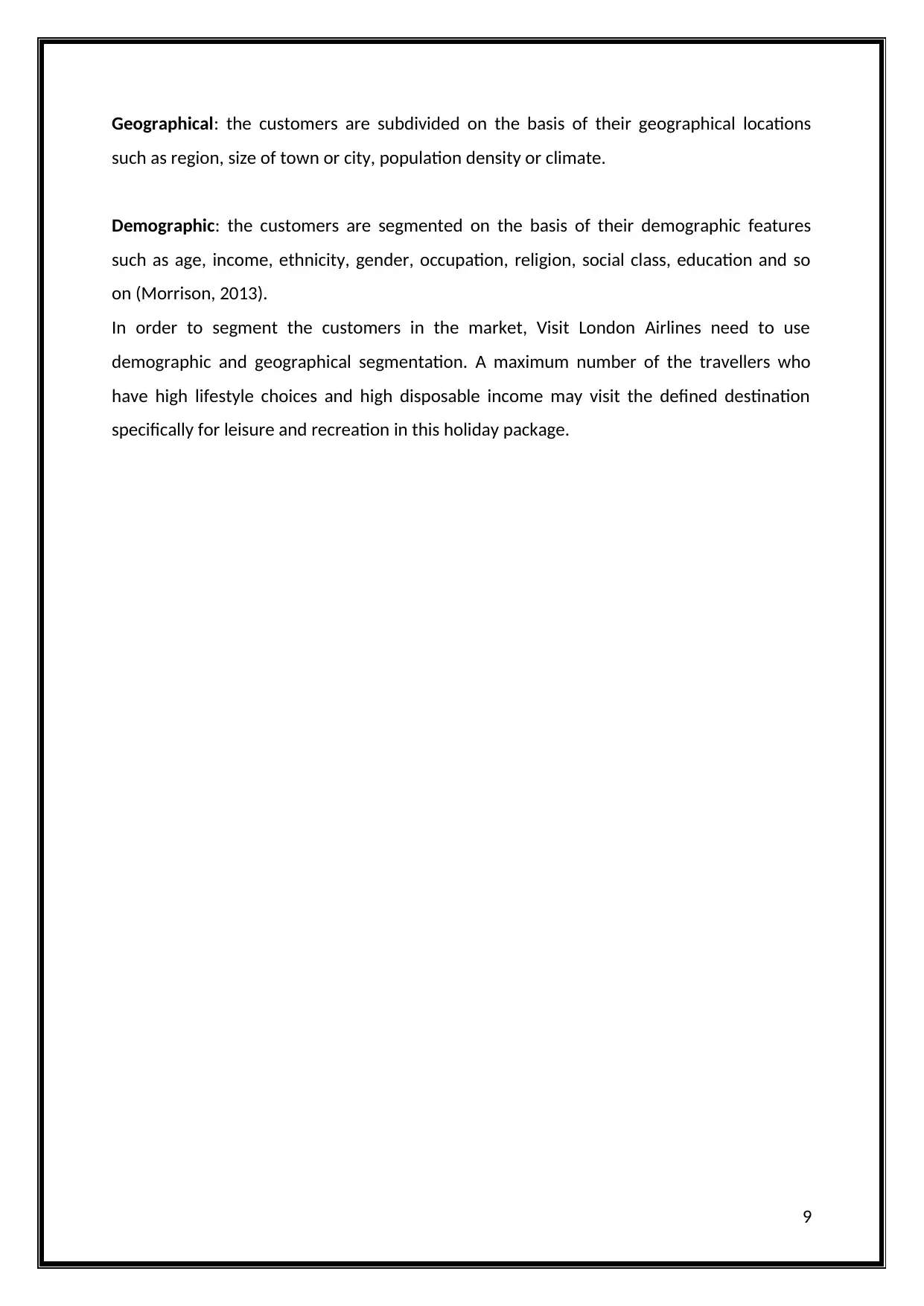
Geographical: the customers are subdivided on the basis of their geographical locations
such as region, size of town or city, population density or climate.
Demographic: the customers are segmented on the basis of their demographic features
such as age, income, ethnicity, gender, occupation, religion, social class, education and so
on (Morrison, 2013).
In order to segment the customers in the market, Visit London Airlines need to use
demographic and geographical segmentation. A maximum number of the travellers who
have high lifestyle choices and high disposable income may visit the defined destination
specifically for leisure and recreation in this holiday package.
9
such as region, size of town or city, population density or climate.
Demographic: the customers are segmented on the basis of their demographic features
such as age, income, ethnicity, gender, occupation, religion, social class, education and so
on (Morrison, 2013).
In order to segment the customers in the market, Visit London Airlines need to use
demographic and geographical segmentation. A maximum number of the travellers who
have high lifestyle choices and high disposable income may visit the defined destination
specifically for leisure and recreation in this holiday package.
9
Paraphrase This Document
Need a fresh take? Get an instant paraphrase of this document with our AI Paraphraser
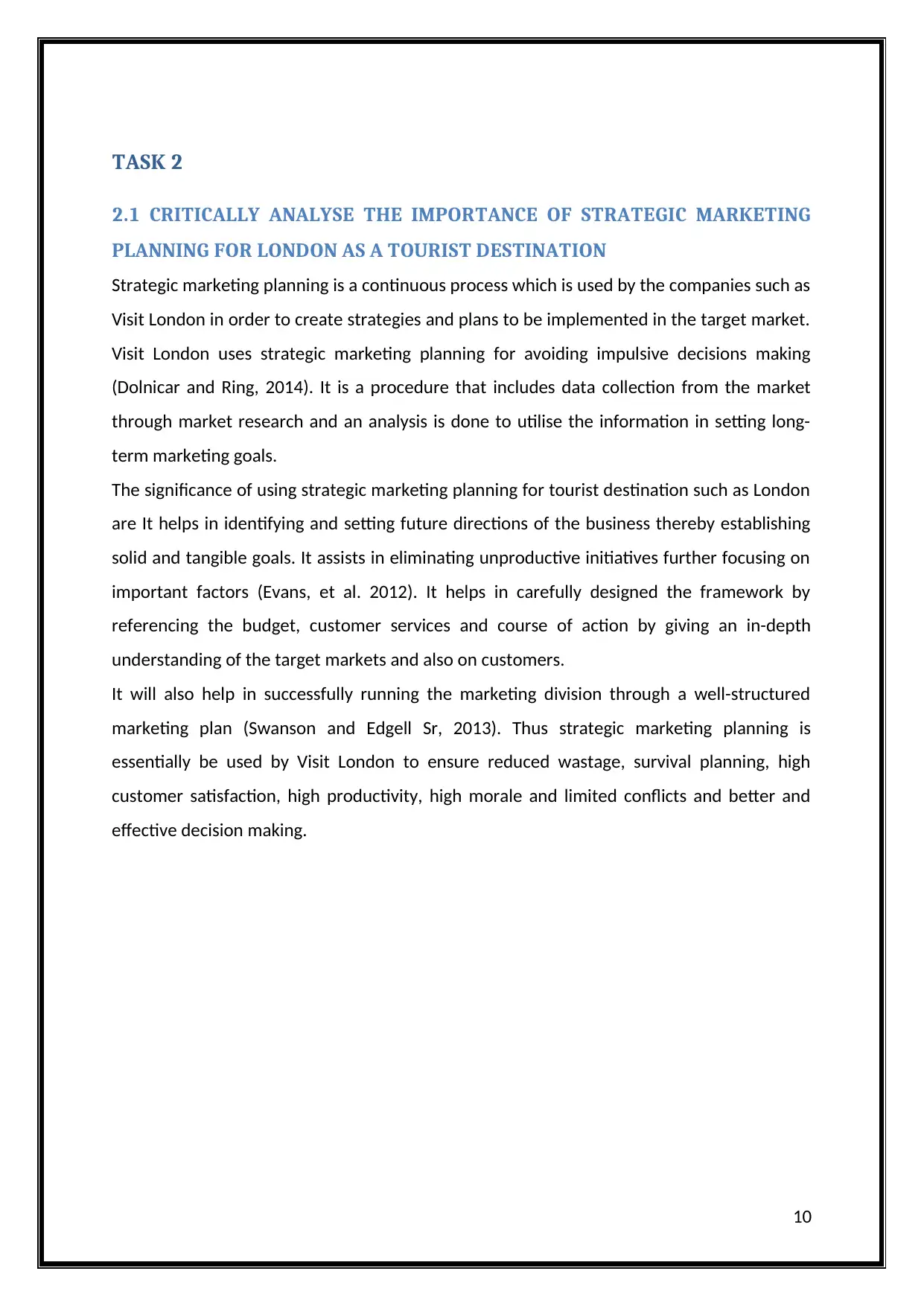
TASK 2
2.1 CRITICALLY ANALYSE THE IMPORTANCE OF STRATEGIC MARKETING
PLANNING FOR LONDON AS A TOURIST DESTINATION
Strategic marketing planning is a continuous process which is used by the companies such as
Visit London in order to create strategies and plans to be implemented in the target market.
Visit London uses strategic marketing planning for avoiding impulsive decisions making
(Dolnicar and Ring, 2014). It is a procedure that includes data collection from the market
through market research and an analysis is done to utilise the information in setting long-
term marketing goals.
The significance of using strategic marketing planning for tourist destination such as London
are It helps in identifying and setting future directions of the business thereby establishing
solid and tangible goals. It assists in eliminating unproductive initiatives further focusing on
important factors (Evans, et al. 2012). It helps in carefully designed the framework by
referencing the budget, customer services and course of action by giving an in-depth
understanding of the target markets and also on customers.
It will also help in successfully running the marketing division through a well-structured
marketing plan (Swanson and Edgell Sr, 2013). Thus strategic marketing planning is
essentially be used by Visit London to ensure reduced wastage, survival planning, high
customer satisfaction, high productivity, high morale and limited conflicts and better and
effective decision making.
10
2.1 CRITICALLY ANALYSE THE IMPORTANCE OF STRATEGIC MARKETING
PLANNING FOR LONDON AS A TOURIST DESTINATION
Strategic marketing planning is a continuous process which is used by the companies such as
Visit London in order to create strategies and plans to be implemented in the target market.
Visit London uses strategic marketing planning for avoiding impulsive decisions making
(Dolnicar and Ring, 2014). It is a procedure that includes data collection from the market
through market research and an analysis is done to utilise the information in setting long-
term marketing goals.
The significance of using strategic marketing planning for tourist destination such as London
are It helps in identifying and setting future directions of the business thereby establishing
solid and tangible goals. It assists in eliminating unproductive initiatives further focusing on
important factors (Evans, et al. 2012). It helps in carefully designed the framework by
referencing the budget, customer services and course of action by giving an in-depth
understanding of the target markets and also on customers.
It will also help in successfully running the marketing division through a well-structured
marketing plan (Swanson and Edgell Sr, 2013). Thus strategic marketing planning is
essentially be used by Visit London to ensure reduced wastage, survival planning, high
customer satisfaction, high productivity, high morale and limited conflicts and better and
effective decision making.
10
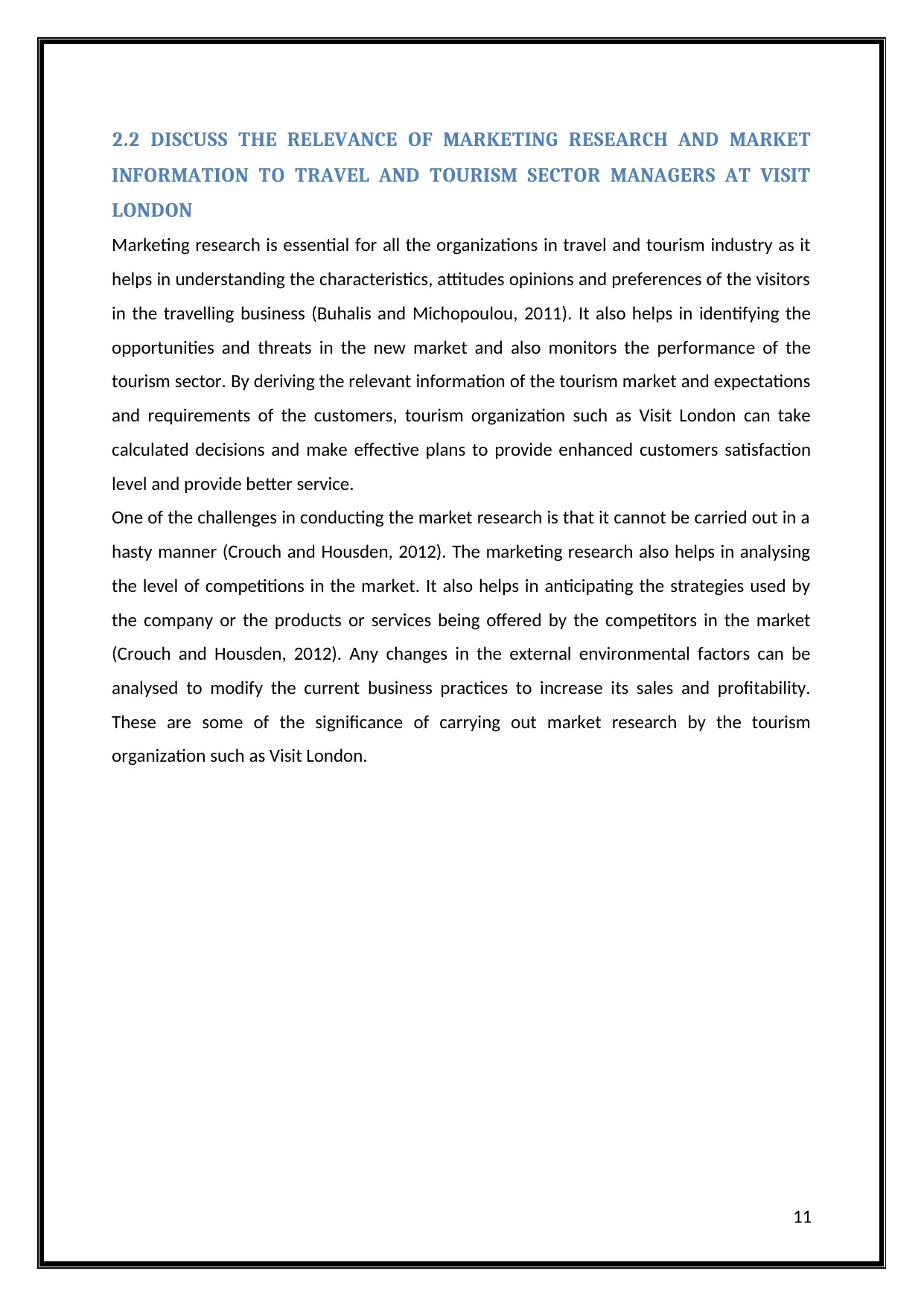
2.2 DISCUSS THE RELEVANCE OF MARKETING RESEARCH AND MARKET
INFORMATION TO TRAVEL AND TOURISM SECTOR MANAGERS AT VISIT
LONDON
Marketing research is essential for all the organizations in travel and tourism industry as it
helps in understanding the characteristics, attitudes opinions and preferences of the visitors
in the travelling business (Buhalis and Michopoulou, 2011). It also helps in identifying the
opportunities and threats in the new market and also monitors the performance of the
tourism sector. By deriving the relevant information of the tourism market and expectations
and requirements of the customers, tourism organization such as Visit London can take
calculated decisions and make effective plans to provide enhanced customers satisfaction
level and provide better service.
One of the challenges in conducting the market research is that it cannot be carried out in a
hasty manner (Crouch and Housden, 2012). The marketing research also helps in analysing
the level of competitions in the market. It also helps in anticipating the strategies used by
the company or the products or services being offered by the competitors in the market
(Crouch and Housden, 2012). Any changes in the external environmental factors can be
analysed to modify the current business practices to increase its sales and profitability.
These are some of the significance of carrying out market research by the tourism
organization such as Visit London.
11
INFORMATION TO TRAVEL AND TOURISM SECTOR MANAGERS AT VISIT
LONDON
Marketing research is essential for all the organizations in travel and tourism industry as it
helps in understanding the characteristics, attitudes opinions and preferences of the visitors
in the travelling business (Buhalis and Michopoulou, 2011). It also helps in identifying the
opportunities and threats in the new market and also monitors the performance of the
tourism sector. By deriving the relevant information of the tourism market and expectations
and requirements of the customers, tourism organization such as Visit London can take
calculated decisions and make effective plans to provide enhanced customers satisfaction
level and provide better service.
One of the challenges in conducting the market research is that it cannot be carried out in a
hasty manner (Crouch and Housden, 2012). The marketing research also helps in analysing
the level of competitions in the market. It also helps in anticipating the strategies used by
the company or the products or services being offered by the competitors in the market
(Crouch and Housden, 2012). Any changes in the external environmental factors can be
analysed to modify the current business practices to increase its sales and profitability.
These are some of the significance of carrying out market research by the tourism
organization such as Visit London.
11
⊘ This is a preview!⊘
Do you want full access?
Subscribe today to unlock all pages.

Trusted by 1+ million students worldwide
1 out of 21
Related Documents
Your All-in-One AI-Powered Toolkit for Academic Success.
+13062052269
info@desklib.com
Available 24*7 on WhatsApp / Email
![[object Object]](/_next/static/media/star-bottom.7253800d.svg)
Unlock your academic potential
Copyright © 2020–2026 A2Z Services. All Rights Reserved. Developed and managed by ZUCOL.





